Avast SecureLine VPN is a pretty popular service. While it’s a premium provider by default, the company also offers a 7-day free trial. It’s no wonder users are often asking whether Avast SecureLine VPN is safe and secure given its excellent commodities for newcomers.
In today’s analysis, we’ll take an in-depth look at this service. We also have a full review of Avast VPN, which you can check out. However, our mission isn’t to repeat everything we said there. Instead, we’ll focus on its security and privacy aspects to see if the VPN is really reliable and legit.
Aside from its security features, we’ll examine its privacy policy, see where it’s based, and do a comprehensive IP/DNS leak test. If the provider passes ALL 3 tests, we will consider it safe and secure. If it fails even one of them, it’s not. Let’s see what this popular provider has to offer.
Is Avast SecureLine VPN Safe to Use? Security Features Examined
When you first install a VPN, you’re met with its application and the security features within it. So, to answer the question of whether Avast SecureLine VPN is safe and secure, we need to look at them first.
AES-256 Encryption
The good news is that the provider uses AES-256 encryption. This encryption is present in both free and paid versions and serves as a safeguard of your privacy and security. As many of you know, this is the highest level of encryption you can get in a VPN.
Not to mention it’s impenetrable even by the most skilled hackers, which is even more reassuring. Vital to point out is that you can’t choose the level of encryption or alter it in any way. It’s used with every protocol, so Avast won’t take any chances and compromise your security intentionally.
Several Security Protocols
Speaking of protocols, Avast SecureLine VPN offers reliable choices that you’ll find in all premium providers. First, there’s OpenVPN, which is an old-school protocol with an excellent balance of speed and security. It’s a legit and safe protocol used by pretty much every VPN.
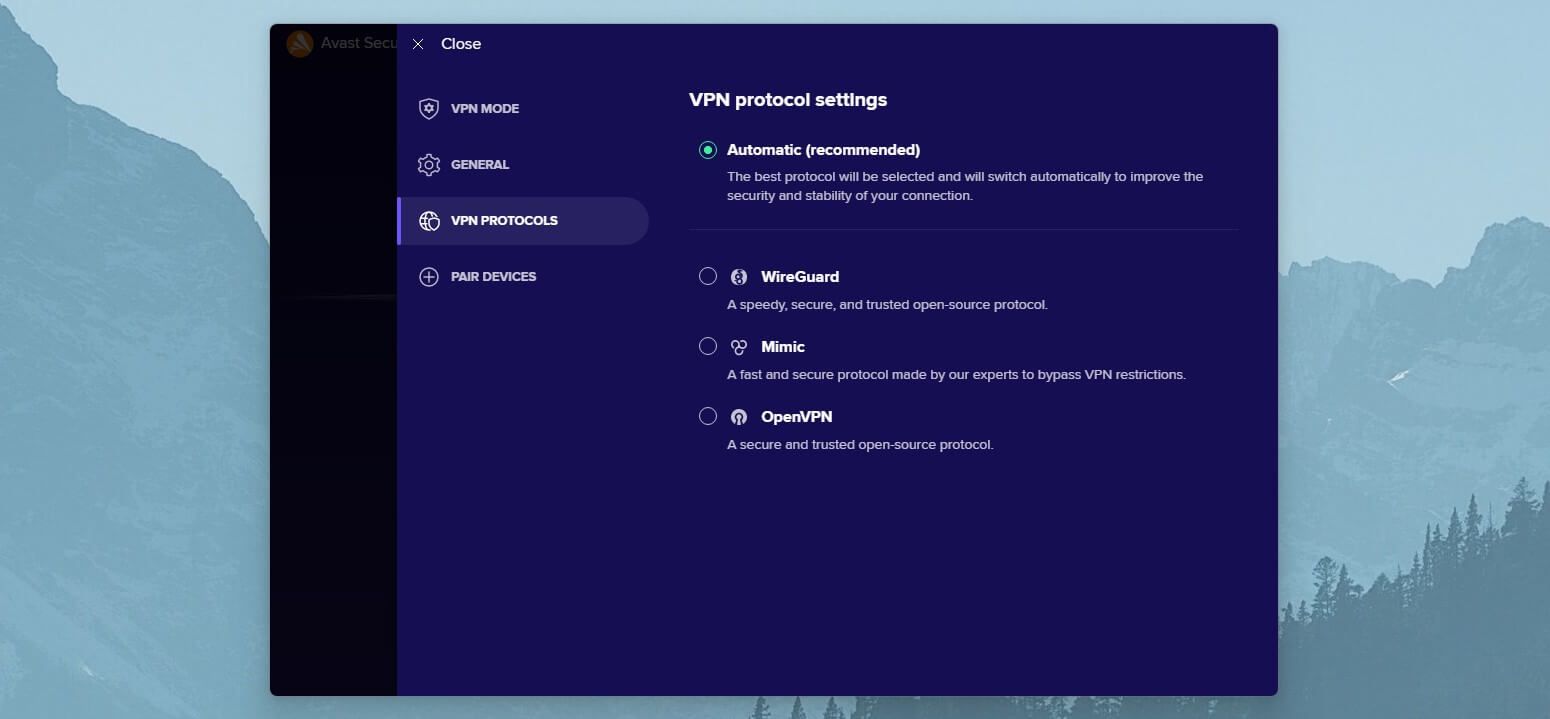
Next, there’s WireGuard – the one we like the most. It’s a lightweight protocol and an open-source solution for decreasing connection times and ensuring excellent speeds. We talked about it when we discussed NordLynx. NordLynx is NordVPN’s version of WireGuard.
Lastly, Avast SecureLine VPN offers a protocol called Mimic. Mimic is a proprietary solution made by Avast. The company claims that this is a “fast and secure protocol for bypassing VPN restrictions.” However, while it’s fast and safe, it’s worth noting that it isn’t great for circumventing censorship.
Overall, all of its protocols are safe and secure and we can’t complain about any of them.
Kill Switch
Having a VPN kill switch is a must if you want to ensure you’re always anonymous online. If you accidentally lose the VPN connection, your IP address will be exposed and your privacy compromised. The kill switch is here to prevent that from happening.
It will stop all traffic and disable the internet connection even at the slightest sign of VPN-related problems. The kill switch, however, doesn’t support the advanced options we’ve seen in NordVPN, which is a shame.
NordVPN has the option to apply the kill switch to particular apps only but here, it works on the system level and shuts down all traffic. Either way, our tests showed that it works properly, which is, after all, the most important factor.
Smart VPN
Smart VPN isn’t a security feature at its core. It’s more like an algorithm used to power up the VPN when doing certain things. You can use this feature to connect to a VPN when you’re streaming, using banking sites, downloading torrents, or connecting to public networks.
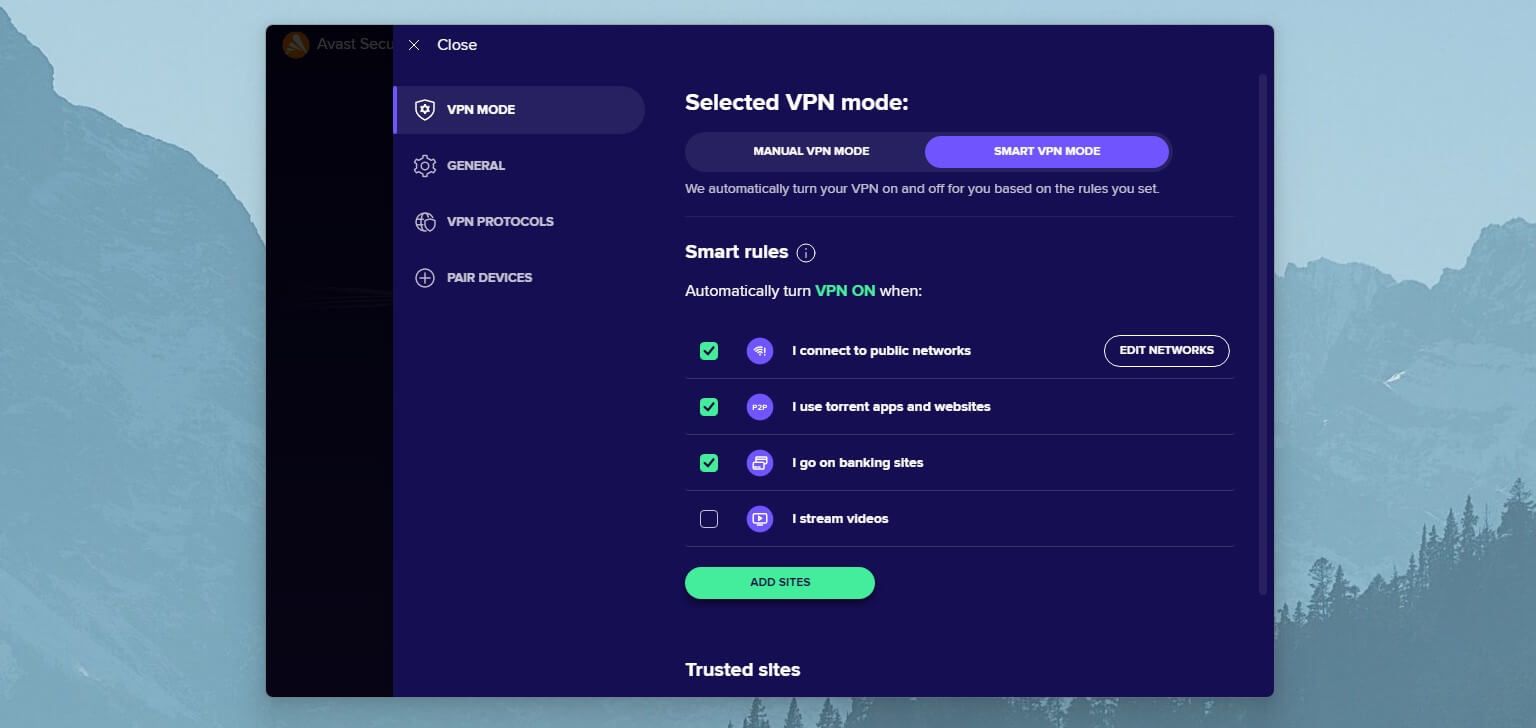
Furthermore, you can set the Virtual Private Network to turn on when visiting particular sites that you can add to the list. Basically, this is the Automation mode that’ll help you if you often forget to turn on the VPN. Once you set your Smart Rules, Avast SecureLine will work in your favor without you doing anything.
All you have to do is ensure that the VPN is working in the background and it’ll connect and disconnect based on the parameters you set. We found this feature very handy in many instances, especially when testing the provider on public WiFi networks where even our experts sometimes forget to use a VPN.
DNS and IP Leak Protection
Hiding your IP address is crucial for remaining anonymous on the internet. Is Avast SecureLine VPN safe in terms of preventing leaks? Well, it does have IP/DNS leak protection, so it’s legit in this regard. But we’ll see if this feature is reliable at the end of our security analysis.
Does Avast SecureLine VPN Store Logs? Analysis of Its Privacy Policy & Jurisdiction
Okay, so let’s see if Avast is a company you can trust and if its VPN service stores any logs.
Where Is the Company Based?
Avast is based in the Czech Republic, which, on paper, is outside of the 5/9/14 Eyes alliance. However, keep in mind that the country is in Europe and it’s a member of the European Union – a not very privacy-friendly group of countries.
Besides, the European Union closely cooperates with the US, as it’s the US creation, so it’s highly likely that this country has contact with 5 Eyes countries. For those who don’t know, the US is a founding member of the 5 Eyes, along with the UK.
For us, the problem isn’t the jurisdiction. We tested HideMyAss VPN, a UK-based service, and concluded that it’s safe and secure, with an audited no-logs policy. The problem here is the company itself – Avast.
Is Avast SecureLine VPN Safe in Terms of Logging Practices?
Its free antivirus was at the forefront of the scandal that transpired a few years ago. This antivirus is used by thousands if not millions of people globally. However, this free product isn’t paid for with money but with the private data of its users, which tells us that nothing is free.
Avast indeed stored and sold users’ private data, including browsing history, to large companies such as IBM, L’Oreal, and Home Depot. We don’t know if this is still the case but we can speculate that its logging practices haven’t changed, as the scandal was quickly swept under the rug.
A few years ago, Avast was once again brought into the spotlight for its free browser extension. This extension collected the personal data of its users, which had a huge impact on users’ privacy and made Avast a less trustworthy company.
Privacy Policy Examination
Is Avast SecureLine safe to use then? Well, the privacy policy, in the VPN part, tells us that the provider doesn’t store your IP address, browsing/downloading history, DNS requests, geolocation, and other sensitive information.
We also stated that it offers DNS leak protection, meaning the company uses its proprietary DNS servers to handle your DNS requests. On the other hand, it does store a bit more data than we’d like. There are connection timestamps, which we don’t like, plus the amount of transferred data.
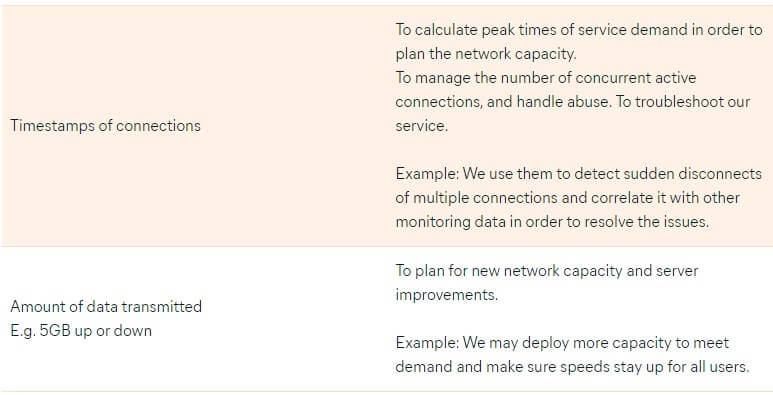
This information isn’t critical and most likely won’t be associated with your identity. However, you should keep in mind that Avast preserves this information on its servers for up to 35 days, which is later deleted on a rolling basis, as the company claims.
To cut it short, we aren’t fond of its privacy policy and we don’t think it’s a no-logs policy. ExpressVPN’s no-logging policy is much more privacy-friendly, on top of which, it has 3 third-party audits that prove everything the company proudly presents.
Third-Party Audits
Having said everything about the company, you can’t expect it to have any third-party audits and certifications. Indeed, Avast SecureLine VPN isn’t safe and secure in this regard and is far less trustworthy than, let’s say, ExpressVPN, CyberGhost, or NordVPN.
We listed these services in our top 10 VPN comparison, so make sure you check it out. Is Avast SecureLine VPN legit now that we know this? Well, it is legit as a company but it’s far from being 100% safe and secure.
IP & DNS Leak Tests: Let’s See if There’re Any Leaks
Despite the shortcomings in the previous test, let’s stick to our security analysis until the end. It’s time to see if the provider displays unwanted IP/DNS leaks. First of all, we’ll show you our native IP/DNS leak test results when not using a Virtual Private Network.
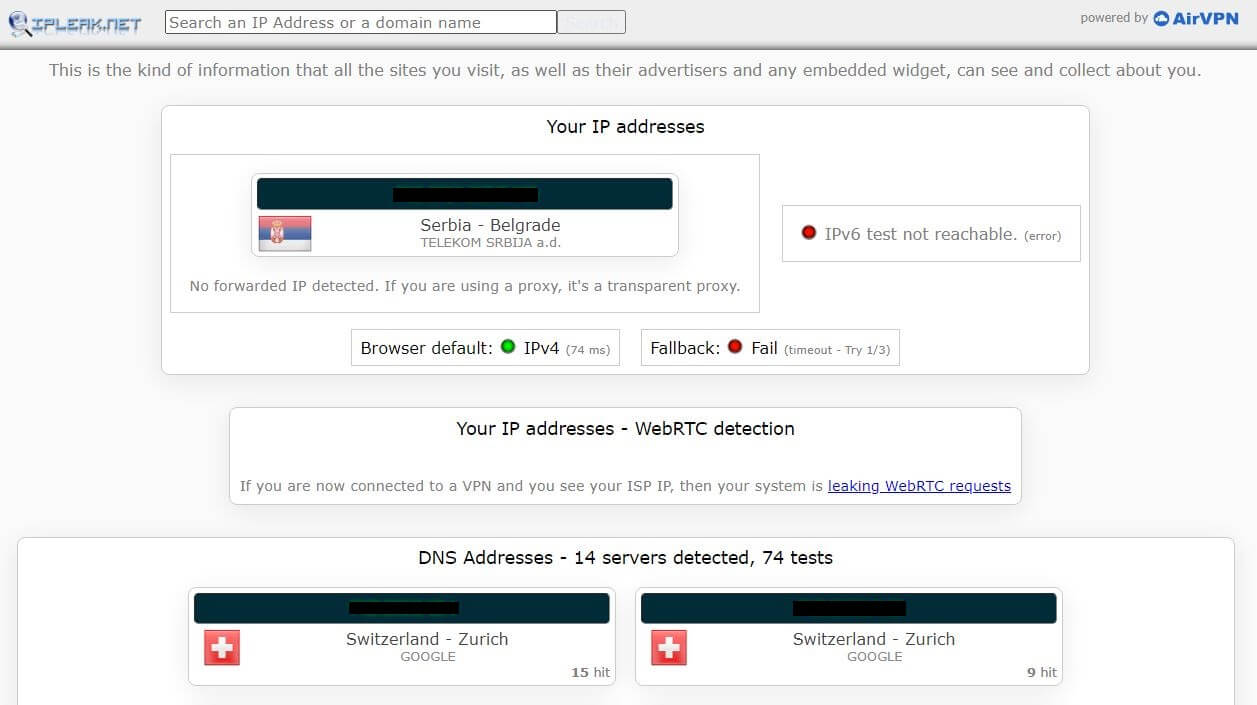
At the time of testing, we were in Belgrade but we blurred our addresses for privacy reasons. The test was done on ipleak.net, so we connected to the US server with Avast SecureLine and repeated the test.
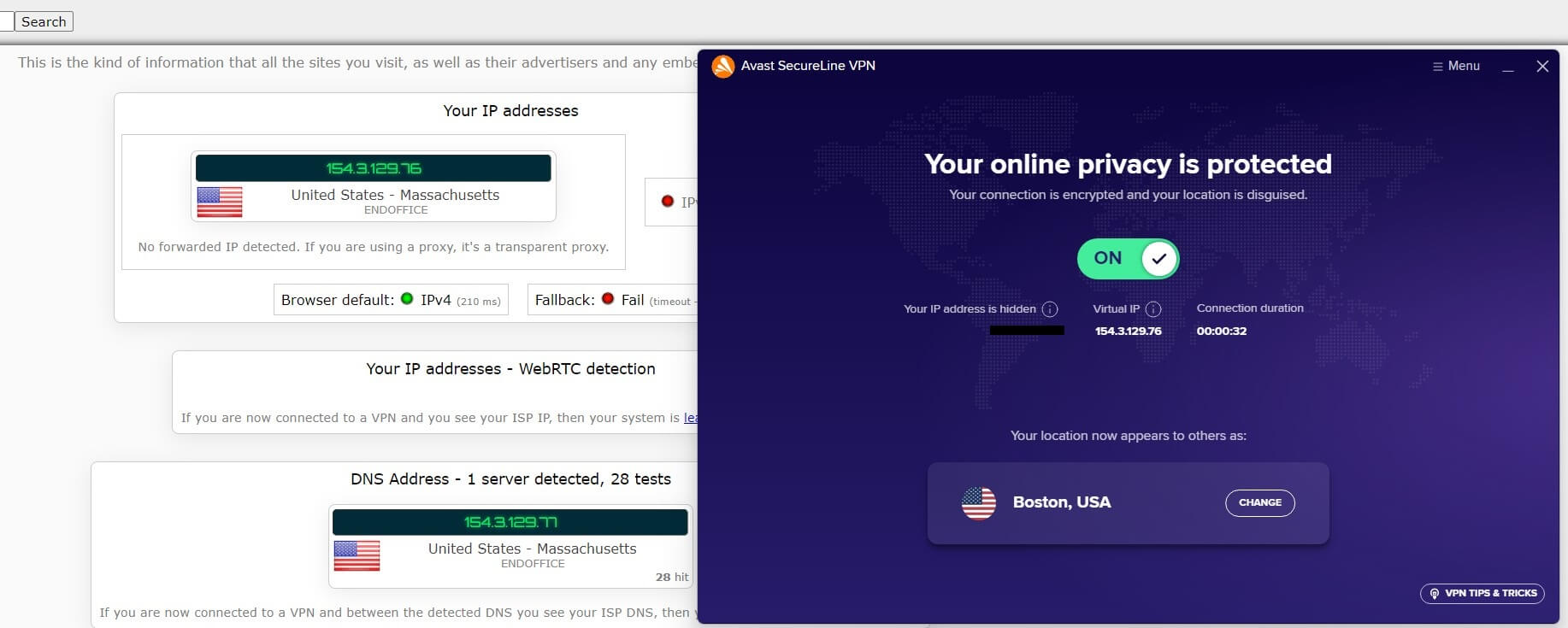
The image above shows you the test results, and as you can see, they’re great. The provider isn’t leaking or IP and DNS, fully securing our connection in the process.
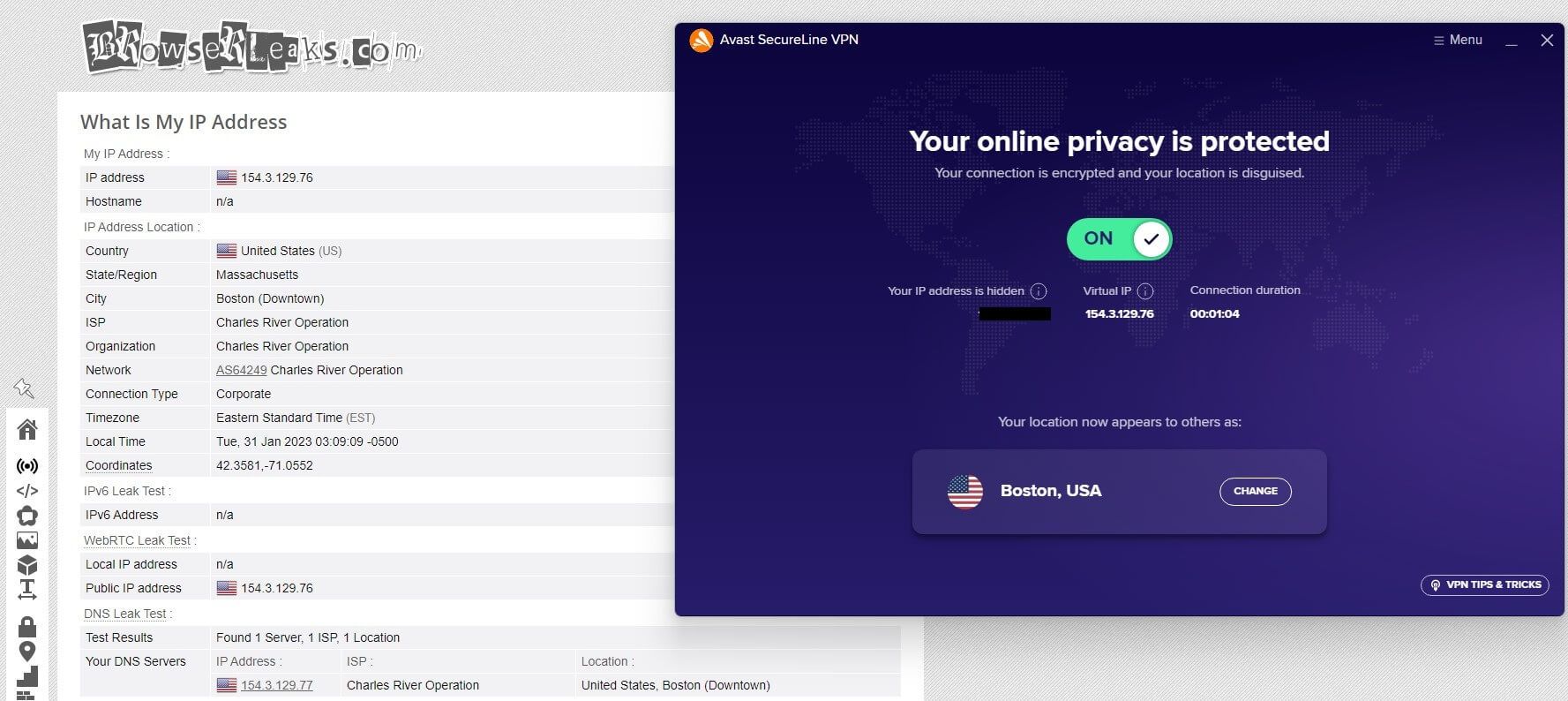
To confirm our great results, we went to browserleaks.com, a site we often use to test VPNs and make sure they work properly. As you can see, it shows the same results, with both IP and DNS addresses based in the US. Thanks to modern encryption protocols and decent security features, Avast SecureLine VPN proved to be very capable.
So, Is Avast SecureLine VPN Safe to Use?
In the end, we need to definitely address the question of Avast SecureLine VPN’s safety and security. Out of three, the provider failed on one test, which means it’s not entirely safe to use. On the technical side, the provider is more than great.
It offers modern protocols, bank-grade encryption, and superb IP/DNS leak protection. The main problem with the VPN is its father company – Avast – which is known for deceptive business practices. This puts a huge stain on the company’s reputation and makes it extremely hard to trust it fully.
Its no-logging policy isn’t the most convincing either, and having in mind its data-selling practices from the past, we can’t guarantee you’ll be happy with it. Another nail in the coffin is the lack of any third-party audits, making Avast SecureLine VPN an inferior choice to ExpressVPN – our favorite alternative.
ExpressVPN is not only much safer but also a more reliable VPN overall. Plus, it offers a 49% discount and 3 free months for the annual plan, which is complemented by a 30-day money-back guarantee. We recommend getting it using the button above and claiming its cheapest deal – it’s not gonna last forever.
Alternatively, check our Avast SecureLine VPN vs NordVPN comparison. You’ll find that NordVPN is yet another superior provider that you can also get instead. Despite its cheap price and a free trial, we still can’t recommend Avast’s Virtual Private Network – sorry to disappoint you.